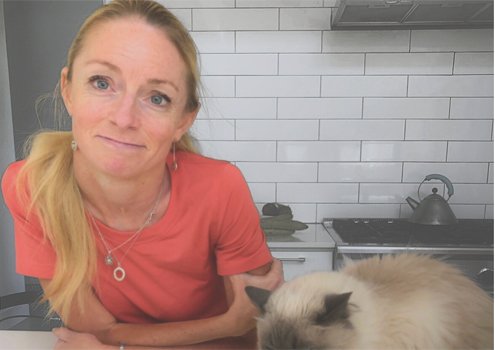Reading time: About 2 minutes
Mel Williams believes that writing is less a talent and more of a learned practice and a deliberate act…
Mel Williams is a Toronto-based writer living with an acquired disability. She practices narrative advocacy — telling stories that quietly challenge societal norms and broaden our understanding of one another. She was longlisted for gritLIT’s 2025 short story contest and was a featured poet at Toronto’s 2022 Emerging Writers Reading Series. Her unpublished memoir Little Flames Under My Skin, is the runner-up for AWP’s 2025 Sue William Silverman Prize for Creative Nonfiction.
I was excited to talk to Mel about how she approaches writing.
Q. Roughly how much time do you spend writing every day?
I spend four to five hours a day writing in some form — whether it’s new writing for my novel-in-progress, or shorter pieces for my Substack newsletter, or forming queries for my unpublished memoir Little Flames Under My Skin.
Q. What’s a simple activity or habit that makes you a better writer?
I have two. Joining a writing group. This has helped me feel like I’m part of a community, sustains a regular practice and makes me accountable to someone other than myself. The second is finding a mentor––someone admired as a writer and human. My mentor has supported me through several projects. Her advice and guidance have often felt like a form of therapy.
Q. What interferes with your writing?
Coffee breaks that extend into reorganizing my cutlery drawer or purging expired refrigerator items. Productive procrastination is its own art-form. And watching tennis with friends and my Siamese cat, Lilo. We’re huge fans.
Q. How do you persuade yourself to sit down to write on days when you really, really DON’T feel like doing it?
On days when the creativity doesn’t spark new sentences, I focus on editing instead.
Q. Is there a particular motto or saying that you’ve found helpful for writing?
My Humber writing instructor David Bergen offered a line I return to when I’m stuck. He encouraged me to use imagery and metaphor to: “Elevate the physical into the metaphysical…And then the mind must grasp the tenuousness of the body’s existence.” In learning to leave the body on the page, I find ways to return to it.
Q. Which stage of the writing process do you enjoy the most: researching, writing or editing/rewriting and why?
Editing/rewriting is my sweet spot. I think this stems from my early career in media/news. I enjoy visualizing, then crafting the final form and sending it to press.
Q. What’s one of the best books you’ve read (either fiction or non) in the last five years?
Two of my recent favourite reads have been Everything I Have Is Yours: A Marriage, by Eleanor Henderson, and Lost in the Valley of Death: A Story of Obsession and Danger in the Himalayas, by Harley Rustad. I love books that explore the extremes of the human experience.
Q. What book are you reading right now?
I just started reading The Serviceberry by Robin Wall Kimmerer.
Q. What do you think is the biggest misperception that new writers have about the act of writing?
That writers are born with innate talent, and a flurry of story ideas. For me, writing has been a learned practice and a deliberate act. I have grown alongside my writing. The act of writing has taught me a lot about community, belonging, living alongside rejection, and thriving through periods of grief.


